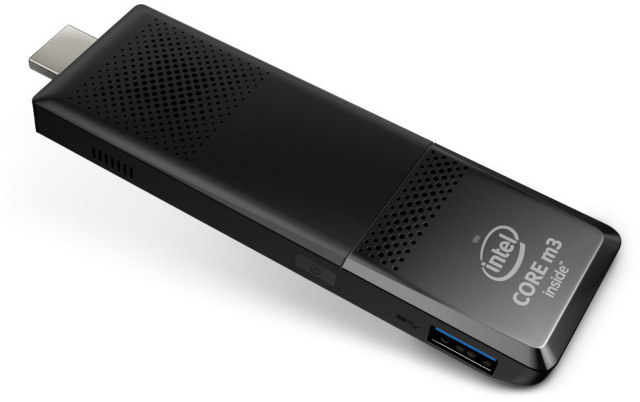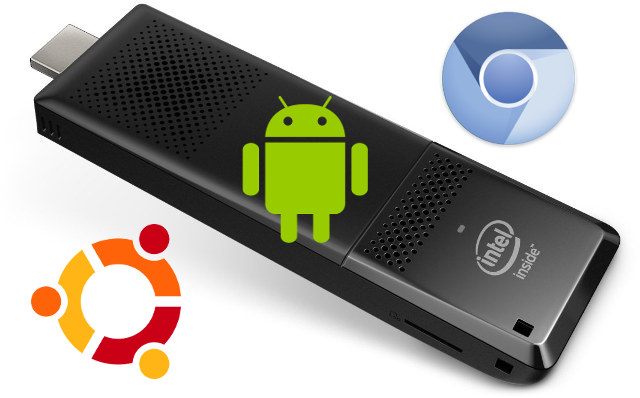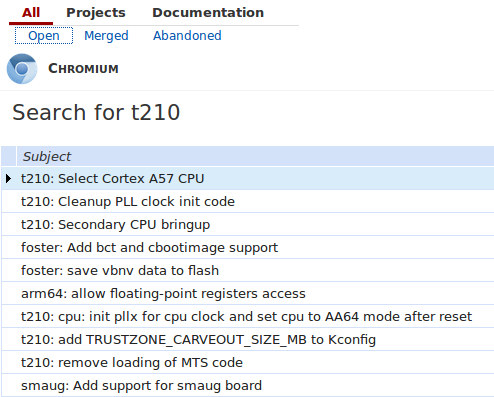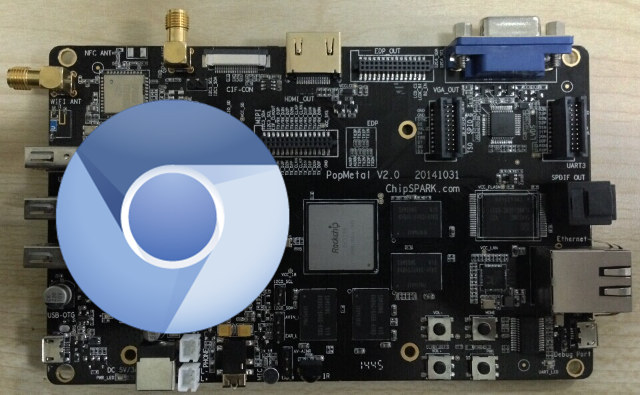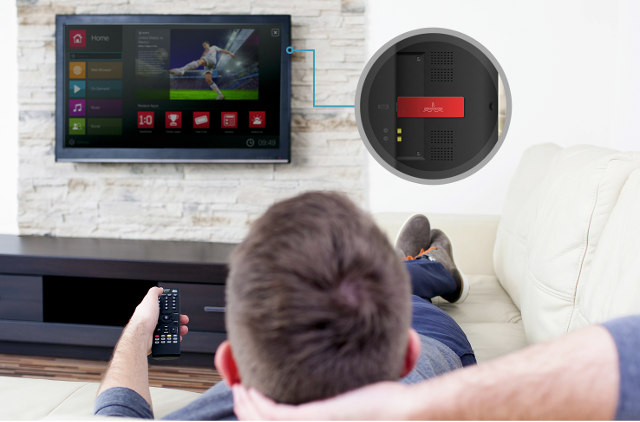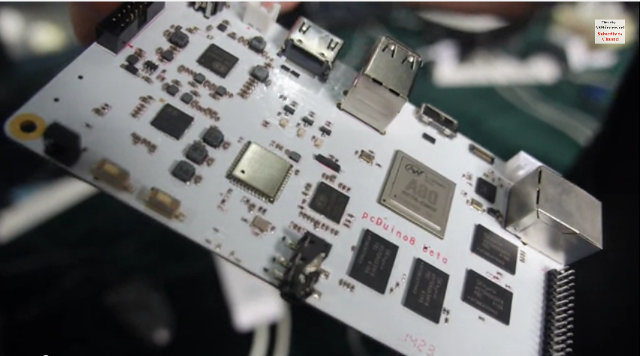Intel unveiled five new Compute Sticks for 2016, with two Cherry Trail models, and three Skylake Core M models namely STK2M3W64CC and STK2MV64CC based on Intel Core m3-6Y30 processor, as well as STK2MV64CC with a more powerful Core m5-6Y57 vPRO processor. Ian Morrison (Linuxium) managed to get an early sample of STK2M3W64CC running Windows 10 on 4GB RAM and 64GB storage, and posted some benchmarks, as well as results of his experimentations with Ubuntu and Chrome OS in the Intel section of G+ MINI PCs community and his own website. He started by running some standard benchmarks in Windows 10 including CrystalDiskMark (storage performance), Passmark8, and 3DMark, and while the storage performance is underwhelming, the processor is clearly and noticeably faster than Braswell, and Cherry Trail processors in terms of CPU and GPU performance based on comparisons with Tronsmart Ara X5 (x5-Z8300), Kangaroo Mobile Desktop (x5-Z8500), Voyo V3 (x7-Z8700), and […]
Android, Chromium OS, and Ubuntu on Intel Atom x5 Compute Stick. What Works, What Doesn’t.
The latest “STK1AW32SC” Intel Compute Stick, also called Sterling City, is powered by an Intel Atom x5-Z8300 processor with 2GB RAM and 32GB storage, and pre-loaded with Windows 10. There’s also a version with operating systems dubbed STK1A32SC, but currently only the Windows version is available on Amazon US. That doesn’t not mean you can’t try to install other operating systems on the TV stick, and that’s exactly what Ian Morrison has done with Android 4.4 & 5.1, Phoenix OS, Remix OS (alpha), Chromium OS, and Ubuntu. If you want to know how to install the operating systems, you can follow the instructions for Ubuntu , Chromium OS, or Android/ Remix OS/ Phoenix OS. Bear in mind that installing Android also require that you install Ubuntu first, and there are quite a lot of steps, and once you’ve installed Chromium OS, you could also run Ubuntu using Crouton. So […]
Linaro Connect 2016 Bangkok Schedule – March 7-11, 2016
Linaro Connect Bangkok (BKK16) will take place on March 7 – 11, 2016, and the schedule is now available for the 5-day event with keynotes and sessions. Whether you’re going to attend or not, it’s always interesting to check the schedule to find out what’s going on in terms of ARM Linux development. The five days will focus on work by different Linaro groups, but really sessions are mixed for any given day, and I’ve created a virtual schedule for each day with available information, as Linaro has become a little more closed to the outside than when it was launched a few years ago. Monday 7 – LITE (Linaro IoT & Embedded Group) 1400 – 14:50 – Evolution of the Reference Software Platform Project The Reference Software Platform lead project was introduced in Linaro Connect San Francisco 2015, and since then it evolved and matured with the completion of […]
NayuOS is a Developer Friendly Chromium OS Fork without Google Services
People at Nexedi, an European based open-source software publisher, are doing a lot of development work on Chromebooks, but with Chrome OS, all your data is kept on Google servers when you login, and by default the OS basically runs Chrome browser with barely any development tools. So the company leveraged Chromium OS, the open source version of Chrome OS, to create their own operating system, called NayuOS, that does not run any proprietary software, does without Google servers, and comes with git, nmp and other developer tools by default. The operating system should also provide a better Chromebook experience in China, thanks to the company’s re6stnet app and GrandeNet system allowing to have IPv6 available even when ISPs only provide IPv4, and to work around the unreliable Internet infrastructure in China. The source code and instructions to build an image yourself are available, but the company also released binary […]
Tegra X1 Chromebooks Likely in the Works
When Nvidia announced Tegra X1 processor, the company’s main focus appeared to be the automotive market as it introduced Drive PX and CX board for this very market. Since then, Tegra X1 based SHIELD console was unveiled, and I’ve been informed some development activity related to Tegra X1 (Model: Tegra210 / T210) was taking place in Chromium and especially Coreboot source code. There appears to be two hardware platforms based on Tegra X1: smaug and foster which could end-up being Chromebooks or Chromeboxes likely with 4GB RAM. Thanks to David for the information. Jean-Luc Aufranc (CNXSoft)Jean-Luc started CNX Software in 2010 as a part-time endeavor, before quitting his job as a software engineering manager, and starting to write daily news, and reviews full time later in 2011. www.cnx-software.com
Chromium OS Image for PopMetal Rockchip RK3288 Development Board
We’ve been teased about Chromium OS on Rockchip RK3288 about a year ago, and RK3288 kernel and Chromium overlay have also been available for nearly a year, but AFAIK there hasn’t been any Chromium OS firmware for any particurlar hardware, until yesterday, where Chipspark released a Chromium OS image for their PopMetal board. I haven’t been able to download the file yet, because the download speed is terrible, but you could download chromium_image.tar.gz to have a look. That could mean Rockchip RK3288 based Chrome OS devices may not be so far off now. Jean-Luc Aufranc (CNXSoft)Jean-Luc started CNX Software in 2010 as a part-time endeavor, before quitting his job as a software engineering manager, and starting to write daily news, and reviews full time later in 2011. www.cnx-software.com
Broadcom Unveils BCM725x SoCs for STBs and TV Sticks
Broadcom has recently announced two new SoCs, namely BCM7250 and BCM72502, respectively targeted at OTT streaming media player form factor and HDMI stick or dongle applications. Both feature Broadcom’s Brahma-B15 ARMv7-A cores, support 10-bit H.265, HDMI 2.0, MHL 2.0, and up to to 4×4 5G WiFi via BCM4366 WiSoC. Key features listed by Broadcom for both SoCs: High Efficiency Video Coding (HEVC)/H.265 compression 6000 DMIPS B15 ARMv7-A CPU 1.0 Gpix/s OpenGL ES 3.0 3D GPU Supports HDMI 2.0 with HDCP 2.2 or MHL 2.0 digital video output PCIe connectivity to Broadcom BCM4366 4×4 carrier-grade 5G WiFi 480/576p30 transcode 1080p60 10-Bit HD HEVC decode and 4Kp60 upscale High Performance DDR3/DDR4 system memory interface Supports Android, Chromium, DIAL, DLNA CVP2, Miracast protocols Supports Broadcom Trellis Multi-Application Framework and DTVKit software stack The company can also provide reference platforms with 2×2 and 4×4 5G WiFi connectivity options via a high-speed PCIe interface, and announced […]
PcDuino8 Octa-core Development Board Revealed (Video)
Two AllWinner A80 powered development boards are currently expected. We’ve already seen some pictures of the Cubieboard8, and today we can gt more details about PcDuino8 development board thanks to Charbax who visited Linksprite, and interviewed the company. Here are PcDuino8 (Beta) specifications based on the interview and pictures: SoC – AllWinner A80 octa core big.LITTLE processor with 4 ARM Cortex A15 cores, 4 Cortex A7 cores, and Imagination PowerVR G6200 GPU System Memory – 1GB Storage – 4GB flash + micro SD Card slot Video Output – HDMI Audio Output – HDMI, stereo audio jack Connectivity – Gigabit Ethernet, Wi-Fi 802.11 b/g/n + Bluetooth 4.0 (AP6330 module) USB – 2x USB 2.0 host ports, 1x Micro-B USB 3.0 port Debugging – 14-pin header for JTAG Expansion Header – 32-pin header Misc – IR receiver Power – Round DC power jack (5V?) The hardware specs are a bit lower compared […]


